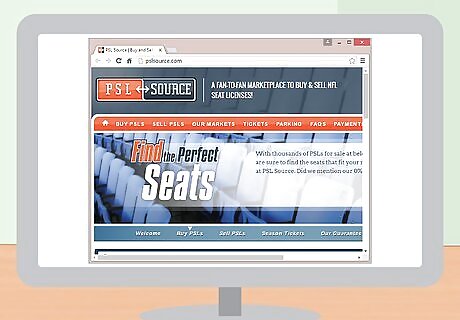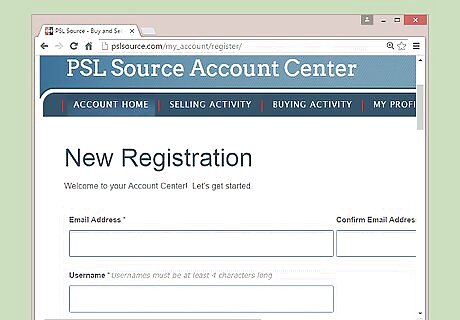
views
X
Research source
The PSL owner can also sell the license to someone else. In order to get a PSL, you need to find the sales agent or broker who handles sales of PSLs.
Finding Personal Seat Licenses

Look for teams building new stadiums. Personal seat licenses (PSLs) are how owners help finance the construction of new stadiums. For this reason, if a team is building a new stadium, then they may be selling PSLs.

Identify teams which already have PSLs. Currently, PSLs are available for some NFL, MLB, NHL, and NBA teams. They also are available for car racing speedways and the Kentucky Derby. Call up a team and ask if they sell PSLs. You can also search online. If a stadium has PSLs, then you can be sure some will be sold online.

Find initial public offerings. When a stadium is being built, the team will initially work through an agent to sell the seats. This is the “initial public offering.” Initial public offerings will have the most seats available for sale. The team will appoint an agent who will handle the initial sale of PSLs. You will then purchase the PSL through the agency. To find the agency, you should search the Internet. Alternately, you could call the team and ask what agent is handling their sales. Also ask about the sales date. Seats could sell quickly—particularly luxury boxes.

Find secondary market brokers. PSL owners are allowed to sell their licenses to other people. When you buy from a PSL owner (and not from the team), then you are buying on the “secondary market.” Type “PSL broker” and then the team into your favorite web browser. For fans of American football, pslsource.com is a good website. It handles PSL sales for over a dozen teams.
Purchasing a Personal Seat License

Think twice. Personal seat licenses used to be a great investment. You not only got to buy season tickets, but you could then turn around and sell the PSL to someone else and make a profit. However, PSLs in initial public offerings are selling for much higher prices today. Accordingly, if you try to resell your PSL, you might lose money. PSLs for the New York Jets football team lost an average of $3,233 per seat when they were resold. However, there may still be great deals to be had. In particular, lower-level seats are usually priced low, so they may be a good investment. After a few years, you might be able to sell these lower-level PSLs for a profit.

Meet with a sales agent. When a team makes an initial public offering of PSLs, they may give season ticket holders the right to buy PSLs first. You can then visit the new stadium and meet with a sales agent to discuss pricing. If you are not a season ticket holder, then you should contact the sales agent and try to get on the waitlist.

Purchase from a secondary market. Once you find a broker who sells PSLs on the secondary market, you can create an account on their website. The sales process will vary by broker. But generally you can search by team. An image of the stadium will come up, and available PSL seats will be highlighted. A price should also be shown. You can then make an offer. The list price is a starting point for negotiation.

Negotiate with the seller on the secondary market. Many online brokers encourage you to negotiate. The price listed should be the starting point for negotiations. The seller probably expects you to negotiate, as well. Unless you desperately want the PSL, you should make an initial offer below the asking price. For example, if the asking price is $10,000, then you might want to offer $6,000 as an opening bid. The owner might counter-offer for $9,500. You can continue to go back and forth until the seller lowers the price to a number you are comfortable with.

Make a purchase. When you come to an agreement, you will submit payment through the online broker. You are also responsible for any transfer fee charged by the team.

Renew your PSL. Personal seat licenses do not typically last indefinitely. The Atlanta Falcons PSLs, for example, last for 30 years with five-year renewal options. To renew your PSL, you should work with the team, not the online broker.



















Comments
0 comment